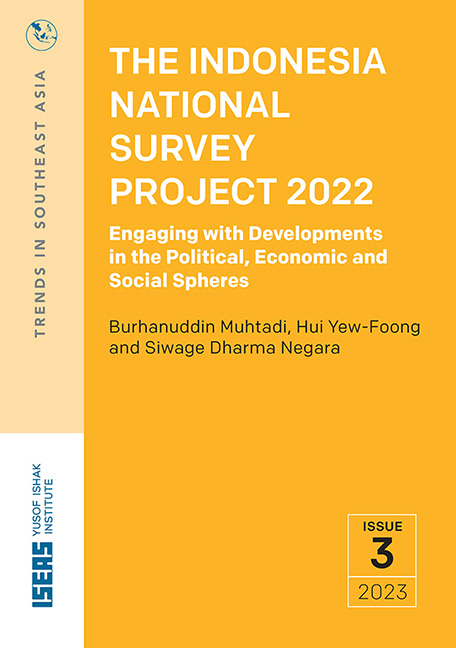 The Indonesia National Survey Project 2022
The Indonesia National Survey Project 2022 Book contents
- Frontmatter
- Foreword
- Table of Contents
- List of Figures and Tables
- The Indonesia National Survey Project 2022: Engaging with Developments in the Political, Economic and Social Spheres: Executive Summary
- 1 The Indonesia National Survey Project 2022: Engaging with Developments in the Political, Economic and Social Spheres: Introduction
- 2 Politics
- 3 Economy
- 4 International Relations
- 5 Society
- 6 Current Issues
- 7 Conclusion
6 - Current Issues
Published online by Cambridge University Press: 09 January 2024
- Frontmatter
- Foreword
- Table of Contents
- List of Figures and Tables
- The Indonesia National Survey Project 2022: Engaging with Developments in the Political, Economic and Social Spheres: Executive Summary
- 1 The Indonesia National Survey Project 2022: Engaging with Developments in the Political, Economic and Social Spheres: Introduction
- 2 Politics
- 3 Economy
- 4 International Relations
- 5 Society
- 6 Current Issues
- 7 Conclusion
Summary
Climate Change, Environment, and Energy Transition
As climate change and environmental issues take the spotlight globally, Indonesians have also become increasingly aware of them. The INSP2022 added a series of questions related to awareness and knowledge of climate change and environmental issues, as well as attitudes towards energy transition as a means of addressing these issues.
Respondents are asked for their perception of the frequency of certain environment-related events that have an impact on their lives, and the majority observe that extreme weather (72.6 per cent), crop failure (66 per cent), floods (63.6 per cent) and pollution (57.3 per cent) have become more frequent in recent years (Figure 29).
In terms of attribution, certain events are more likely to be considered by the majority to be natural occurrences, such as extreme weather (70.2 per cent), erosion (68.2 per cent), and crop failure (63.4 per cent) (Figure 30). Events that are more likely to be considered wholly or partially man-made by the majority of respondents include pollution (72.6 per cent), floods (68.2 per cent) and difficulty in hunting or fishing (55 per cent). Notably, none of the events is considered by a majority of respondents as being wholly man-made. Even where pollution is concerned, only 30.5 per cent of respondents consider that to be entirely caused by human actions.
The majority of respondents (85.2 per cent) consider climate and environmental problems as urgent problems that need solving. They think that the main parties who should be responsible are the national government, business industry and individual citizens. For this reason, the majority of respondents agree or strongly agree with the government’s efforts to overcome climate and environmental problems by requiring private companies to participate in funding the solution to environmental problems (85.7 per cent) and imposing a single-use plastic tax (60.8 per cent).
The survey also finds that the majority of respondents support measures that can address climate and environmental problems. These include using cleaner energy sources (75.5 per cent), the use of electric vehicles (63.0 per cent), using solar power instead of electricity generated by the State-owned Electricity Company (Perusahaan Listrik Negara, PLN) (61.9 per cent), and reducing the use of fossil fuels (57.2 per cent) (Table 5).
- Type
- Chapter
- Information
- The Indonesia National Survey Project 2022Engaging with Developments in the Political, Economic and Social Spheres, pp. 53 - 56Publisher: ISEAS–Yusof Ishak InstitutePrint publication year: 2023
